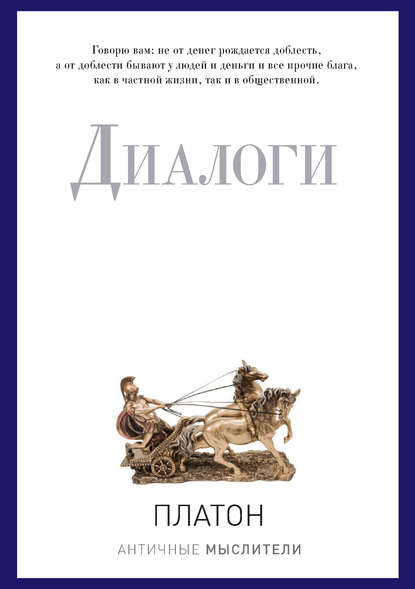 Полная версия
Полная версияПолная версия:
Платон Menexenus
- + Увеличить шрифт
- - Уменьшить шрифт

Plato
Menexenus
APPENDIX I
It seems impossible to separate by any exact line the genuine writings of Plato from the spurious. The only external evidence to them which is of much value is that of Aristotle; for the Alexandrian catalogues of a century later include manifest forgeries. Even the value of the Aristotelian authority is a good deal impaired by the uncertainty concerning the date and authorship of the writings which are ascribed to him. And several of the citations of Aristotle omit the name of Plato, and some of them omit the name of the dialogue from which they are taken. Prior, however, to the enquiry about the writings of a particular author, general considerations which equally affect all evidence to the genuineness of ancient writings are the following: Shorter works are more likely to have been forged, or to have received an erroneous designation, than longer ones; and some kinds of composition, such as epistles or panegyrical orations, are more liable to suspicion than others; those, again, which have a taste of sophistry in them, or the ring of a later age, or the slighter character of a rhetorical exercise, or in which a motive or some affinity to spurious writings can be detected, or which seem to have originated in a name or statement really occurring in some classical author, are also of doubtful credit; while there is no instance of any ancient writing proved to be a forgery, which combines excellence with length. A really great and original writer would have no object in fathering his works on Plato; and to the forger or imitator, the 'literary hack' of Alexandria and Athens, the Gods did not grant originality or genius. Further, in attempting to balance the evidence for and against a Platonic dialogue, we must not forget that the form of the Platonic writing was common to several of his contemporaries. Aeschines, Euclid, Phaedo, Antisthenes, and in the next generation Aristotle, are all said to have composed dialogues; and mistakes of names are very likely to have occurred. Greek literature in the third century before Christ was almost as voluminous as our own, and without the safeguards of regular publication, or printing, or binding, or even of distinct titles. An unknown writing was naturally attributed to a known writer whose works bore the same character; and the name once appended easily obtained authority. A tendency may also be observed to blend the works and opinions of the master with those of his scholars. To a later Platonist, the difference between Plato and his imitators was not so perceptible as to ourselves. The Memorabilia of Xenophon and the Dialogues of Plato are but a part of a considerable Socratic literature which has passed away. And we must consider how we should regard the question of the genuineness of a particular writing, if this lost literature had been preserved to us.
These considerations lead us to adopt the following criteria of genuineness: (1) That is most certainly Plato's which Aristotle attributes to him by name, which (2) is of considerable length, of (3) great excellence, and also (4) in harmony with the general spirit of the Platonic writings. But the testimony of Aristotle cannot always be distinguished from that of a later age (see above); and has various degrees of importance. Those writings which he cites without mentioning Plato, under their own names, e.g. the Hippias, the Funeral Oration, the Phaedo, etc., have an inferior degree of evidence in their favour. They may have been supposed by him to be the writings of another, although in the case of really great works, e.g. the Phaedo, this is not credible; those again which are quoted but not named, are still more defective in their external credentials. There may be also a possibility that Aristotle was mistaken, or may have confused the master and his scholars in the case of a short writing; but this is inconceivable about a more important work, e.g. the Laws, especially when we remember that he was living at Athens, and a frequenter of the groves of the Academy, during the last twenty years of Plato's life. Nor must we forget that in all his numerous citations from the Platonic writings he never attributes any passage found in the extant dialogues to any one but Plato. And lastly, we may remark that one or two great writings, such as the Parmenides and the Politicus, which are wholly devoid of Aristotelian (1) credentials may be fairly attributed to Plato, on the ground of (2) length, (3) excellence, and (4) accordance with the general spirit of his writings. Indeed the greater part of the evidence for the genuineness of ancient Greek authors may be summed up under two heads only: (1) excellence; and (2) uniformity of tradition – a kind of evidence, which though in many cases sufficient, is of inferior value.
Proceeding upon these principles we appear to arrive at the conclusion that nineteen-twentieths of all the writings which have ever been ascribed to Plato, are undoubtedly genuine. There is another portion of them, including the Epistles, the Epinomis, the dialogues rejected by the ancients themselves, namely, the Axiochus, De justo, De virtute, Demodocus, Sisyphus, Eryxias, which on grounds, both of internal and external evidence, we are able with equal certainty to reject. But there still remains a small portion of which we are unable to affirm either that they are genuine or spurious. They may have been written in youth, or possibly like the works of some painters, may be partly or wholly the compositions of pupils; or they may have been the writings of some contemporary transferred by accident to the more celebrated name of Plato, or of some Platonist in the next generation who aspired to imitate his master. Not that on grounds either of language or philosophy we should lightly reject them. Some difference of style, or inferiority of execution, or inconsistency of thought, can hardly be considered decisive of their spurious character. For who always does justice to himself, or who writes with equal care at all times? Certainly not Plato, who exhibits the greatest differences in dramatic power, in the formation of sentences, and in the use of words, if his earlier writings are compared with his later ones, say the Protagoras or Phaedrus with the Laws. Or who can be expected to think in the same manner during a period of authorship extending over above fifty years, in an age of great intellectual activity, as well as of political and literary transition? Certainly not Plato, whose earlier writings are separated from his later ones by as wide an interval of philosophical speculation as that which separates his later writings from Aristotle.
The dialogues which have been translated in the first Appendix, and which appear to have the next claim to genuineness among the Platonic writings, are the Lesser Hippias, the Menexenus or Funeral Oration, the First Alcibiades. Of these, the Lesser Hippias and the Funeral Oration are cited by Aristotle; the first in the Metaphysics, the latter in the Rhetoric. Neither of them are expressly attributed to Plato, but in his citation of both of them he seems to be referring to passages in the extant dialogues. From the mention of 'Hippias' in the singular by Aristotle, we may perhaps infer that he was unacquainted with a second dialogue bearing the same name. Moreover, the mere existence of a Greater and Lesser Hippias, and of a First and Second Alcibiades, does to a certain extent throw a doubt upon both of them. Though a very clever and ingenious work, the Lesser Hippias does not appear to contain anything beyond the power of an imitator, who was also a careful student of the earlier Platonic writings, to invent. The motive or leading thought of the dialogue may be detected in Xen. Mem., and there is no similar instance of a 'motive' which is taken from Xenophon in an undoubted dialogue of Plato. On the other hand, the upholders of the genuineness of the dialogue will find in the Hippias a true Socratic spirit; they will compare the Ion as being akin both in subject and treatment; they will urge the authority of Aristotle; and they will detect in the treatment of the Sophist, in the satirical reasoning upon Homer, in the reductio ad absurdum of the doctrine that vice is ignorance, traces of a Platonic authorship. In reference to the last point we are doubtful, as in some of the other dialogues, whether the author is asserting or overthrowing the paradox of Socrates, or merely following the argument 'whither the wind blows.' That no conclusion is arrived at is also in accordance with the character of the earlier dialogues. The resemblances or imitations of the Gorgias, Protagoras, and Euthydemus, which have been observed in the Hippias, cannot with certainty be adduced on either side of the argument. On the whole, more may be said in favour of the genuineness of the Hippias than against it.
The Menexenus or Funeral Oration is cited by Aristotle, and is interesting as supplying an example of the manner in which the orators praised 'the Athenians among the Athenians,' falsifying persons and dates, and casting a veil over the gloomier events of Athenian history. It exhibits an acquaintance with the funeral oration of Thucydides, and was, perhaps, intended to rival that great work. If genuine, the proper place of the Menexenus would be at the end of the Phaedrus. The satirical opening and the concluding words bear a great resemblance to the earlier dialogues; the oration itself is professedly a mimetic work, like the speeches in the Phaedrus, and cannot therefore be tested by a comparison of the other writings of Plato. The funeral oration of Pericles is expressly mentioned in the Phaedrus, and this may have suggested the subject, in the same manner that the Cleitophon appears to be suggested by the slight mention of Cleitophon and his attachment to Thrasymachus in the Republic; and the Theages by the mention of Theages in the Apology and Republic; or as the Second Alcibiades seems to be founded upon the text of Xenophon, Mem. A similar taste for parody appears not only in the Phaedrus, but in the Protagoras, in the Symposium, and to a certain extent in the Parmenides.
To these two doubtful writings of Plato I have added the First Alcibiades, which, of all the disputed dialogues of Plato, has the greatest merit, and is somewhat longer than any of them, though not verified by the testimony of Aristotle, and in many respects at variance with the Symposium in the description of the relations of Socrates and Alcibiades. Like the Lesser Hippias and the Menexenus, it is to be compared to the earlier writings of Plato. The motive of the piece may, perhaps, be found in that passage of the Symposium in which Alcibiades describes himself as self-convicted by the words of Socrates. For the disparaging manner in which Schleiermacher has spoken of this dialogue there seems to be no sufficient foundation. At the same time, the lesson imparted is simple, and the irony more transparent than in the undoubted dialogues of Plato. We know, too, that Alcibiades was a favourite thesis, and that at least five or six dialogues bearing this name passed current in antiquity, and are attributed to contemporaries of Socrates and Plato. (1) In the entire absence of real external evidence (for the catalogues of the Alexandrian librarians cannot be regarded as trustworthy); and (2) in the absence of the highest marks either of poetical or philosophical excellence; and (3) considering that we have express testimony to the existence of contemporary writings bearing the name of Alcibiades, we are compelled to suspend our judgment on the genuineness of the extant dialogue.
Neither at this point, nor at any other, do we propose to draw an absolute line of demarcation between genuine and spurious writings of Plato. They fade off imperceptibly from one class to another. There may have been degrees of genuineness in the dialogues themselves, as there are certainly degrees of evidence by which they are supported. The traditions of the oral discourses both of Socrates and Plato may have formed the basis of semi-Platonic writings; some of them may be of the same mixed character which is apparent in Aristotle and Hippocrates, although the form of them is different. But the writings of Plato, unlike the writings of Aristotle, seem never to have been confused with the writings of his disciples: this was probably due to their definite form, and to their inimitable excellence. The three dialogues which we have offered in the Appendix to the criticism of the reader may be partly spurious and partly genuine; they may be altogether spurious; – that is an alternative which must be frankly admitted. Nor can we maintain of some other dialogues, such as the Parmenides, and the Sophist, and Politicus, that no considerable objection can be urged against them, though greatly overbalanced by the weight (chiefly) of internal evidence in their favour. Nor, on the other hand, can we exclude a bare possibility that some dialogues which are usually rejected, such as the Greater Hippias and the Cleitophon, may be genuine. The nature and object of these semi-Platonic writings require more careful study and more comparison of them with one another, and with forged writings in general, than they have yet received, before we can finally decide on their character. We do not consider them all as genuine until they can be proved to be spurious, as is often maintained and still more often implied in this and similar discussions; but should say of some of them, that their genuineness is neither proven nor disproven until further evidence about them can be adduced. And we are as confident that the Epistles are spurious, as that the Republic, the Timaeus, and the Laws are genuine.
On the whole, not a twentieth part of the writings which pass under the name of Plato, if we exclude the works rejected by the ancients themselves and two or three other plausible inventions, can be fairly doubted by those who are willing to allow that a considerable change and growth may have taken place in his philosophy (see above). That twentieth debatable portion scarcely in any degree affects our judgment of Plato, either as a thinker or a writer, and though suggesting some interesting questions to the scholar and critic, is of little importance to the general reader.
INTRODUCTION
The Menexenus has more the character of a rhetorical exercise than any other of the Platonic works. The writer seems to have wished to emulate Thucydides, and the far slighter work of Lysias. In his rivalry with the latter, to whom in the Phaedrus Plato shows a strong antipathy, he is entirely successful, but he is not equal to Thucydides. The Menexenus, though not without real Hellenic interest, falls very far short of the rugged grandeur and political insight of the great historian. The fiction of the speech having been invented by Aspasia is well sustained, and is in the manner of Plato, notwithstanding the anachronism which puts into her mouth an allusion to the peace of Antalcidas, an event occurring forty years after the date of the supposed oration. But Plato, like Shakespeare, is careless of such anachronisms, which are not supposed to strike the mind of the reader. The effect produced by these grandiloquent orations on Socrates, who does not recover after having heard one of them for three days and more, is truly Platonic.
Such discourses, if we may form a judgment from the three which are extant (for the so-called Funeral Oration of Demosthenes is a bad and spurious imitation of Thucydides and Lysias), conformed to a regular type. They began with Gods and ancestors, and the legendary history of Athens, to which succeeded an almost equally fictitious account of later times. The Persian war usually formed the centre of the narrative; in the age of Isocrates and Demosthenes the Athenians were still living on the glories of Marathon and Salamis. The Menexenus veils in panegyric the weak places of Athenian history. The war of Athens and Boeotia is a war of liberation; the Athenians gave back the Spartans taken at Sphacteria out of kindness – indeed, the only fault of the city was too great kindness to their enemies, who were more honoured than the friends of others (compare Thucyd., which seems to contain the germ of the idea); we democrats are the aristocracy of virtue, and the like. These are the platitudes and falsehoods in which history is disguised. The taking of Athens is hardly mentioned.
The author of the Menexenus, whether Plato or not, is evidently intending to ridicule the practice, and at the same time to show that he can beat the rhetoricians in their own line, as in the Phaedrus he may be supposed to offer an example of what Lysias might have said, and of how much better he might have written in his own style. The orators had recourse to their favourite loci communes, one of which, as we find in Lysias, was the shortness of the time allowed them for preparation. But Socrates points out that they had them always ready for delivery, and that there was no difficulty in improvising any number of such orations. To praise the Athenians among the Athenians was easy, – to praise them among the Lacedaemonians would have been a much more difficult task. Socrates himself has turned rhetorician, having learned of a woman, Aspasia, the mistress of Pericles; and any one whose teachers had been far inferior to his own – say, one who had learned from Antiphon the Rhamnusian – would be quite equal to the task of praising men to themselves. When we remember that Antiphon is described by Thucydides as the best pleader of his day, the satire on him and on the whole tribe of rhetoricians is transparent.
The ironical assumption of Socrates, that he must be a good orator because he had learnt of Aspasia, is not coarse, as Schleiermacher supposes, but is rather to be regarded as fanciful. Nor can we say that the offer of Socrates to dance naked out of love for Menexenus, is any more un-Platonic than the threat of physical force which Phaedrus uses towards Socrates. Nor is there any real vulgarity in the fear which Socrates expresses that he will get a beating from his mistress, Aspasia: this is the natural exaggeration of what might be expected from an imperious woman. Socrates is not to be taken seriously in all that he says, and Plato, both in the Symposium and elsewhere, is not slow to admit a sort of Aristophanic humour. How a great original genius like Plato might or might not have written, what was his conception of humour, or what limits he would have prescribed to himself, if any, in drawing the picture of the Silenus Socrates, are problems which no critical instinct can determine.
On the other hand, the dialogue has several Platonic traits, whether original or imitated may be uncertain. Socrates, when he departs from his character of a 'know nothing' and delivers a speech, generally pretends that what he is speaking is not his own composition. Thus in the Cratylus he is run away with; in the Phaedrus he has heard somebody say something – is inspired by the genius loci; in the Symposium he derives his wisdom from Diotima of Mantinea, and the like. But he does not impose on Menexenus by his dissimulation. Without violating the character of Socrates, Plato, who knows so well how to give a hint, or some one writing in his name, intimates clearly enough that the speech in the Menexenus like that in the Phaedrus is to be attributed to Socrates. The address of the dead to the living at the end of the oration may also be compared to the numerous addresses of the same kind which occur in Plato, in whom the dramatic element is always tending to prevail over the rhetorical. The remark has been often made, that in the Funeral Oration of Thucydides there is no allusion to the existence of the dead. But in the Menexenus a future state is clearly, although not strongly, asserted.
Whether the Menexenus is a genuine writing of Plato, or an imitation only, remains uncertain. In either case, the thoughts are partly borrowed from the Funeral Oration of Thucydides; and the fact that they are so, is not in favour of the genuineness of the work. Internal evidence seems to leave the question of authorship in doubt. There are merits and there are defects which might lead to either conclusion. The form of the greater part of the work makes the enquiry difficult; the introduction and the finale certainly wear the look either of Plato or of an extremely skilful imitator. The excellence of the forgery may be fairly adduced as an argument that it is not a forgery at all. In this uncertainty the express testimony of Aristotle, who quotes, in the Rhetoric, the well-known words, 'It is easy to praise the Athenians among the Athenians,' from the Funeral Oration, may perhaps turn the balance in its favour. It must be remembered also that the work was famous in antiquity, and is included in the Alexandrian catalogues of Platonic writings.
PERSONS OF THE DIALOGUE: Socrates and Menexenus
SOCRATES: Whence come you, Menexenus? Are you from the Agora?
MENEXENUS: Yes, Socrates; I have been at the Council.
SOCRATES: And what might you be doing at the Council? And yet I need hardly ask, for I see that you, believing yourself to have arrived at the end of education and of philosophy, and to have had enough of them, are mounting upwards to things higher still, and, though rather young for the post, are intending to govern us elder men, like the rest of your family, which has always provided some one who kindly took care of us.
MENEXENUS: Yes, Socrates, I shall be ready to hold office, if you allow and advise that I should, but not if you think otherwise. I went to the council chamber because I heard that the Council was about to choose some one who was to speak over the dead. For you know that there is to be a public funeral?
SOCRATES: Yes, I know. And whom did they choose?
MENEXENUS: No one; they delayed the election until tomorrow, but I believe that either Archinus or Dion will be chosen.
SOCRATES: O Menexenus! Death in battle is certainly in many respects a noble thing. The dead man gets a fine and costly funeral, although he may have been poor, and an elaborate speech is made over him by a wise man who has long ago prepared what he has to say, although he who is praised may not have been good for much. The speakers praise him for what he has done and for what he has not done – that is the beauty of them – and they steal away our souls with their embellished words; in every conceivable form they praise the city; and they praise those who died in war, and all our ancestors who went before us; and they praise ourselves also who are still alive, until I feel quite elevated by their laudations, and I stand listening to their words, Menexenus, and become enchanted by them, and all in a moment I imagine myself to have become a greater and nobler and finer man than I was before. And if, as often happens, there are any foreigners who accompany me to the speech, I become suddenly conscious of having a sort of triumph over them, and they seem to experience a corresponding feeling of admiration at me, and at the greatness of the city, which appears to them, when they are under the influence of the speaker, more wonderful than ever. This consciousness of dignity lasts me more than three days, and not until the fourth or fifth day do I come to my senses and know where I am; in the meantime I have been living in the Islands of the Blest. Such is the art of our rhetoricians, and in such manner does the sound of their words keep ringing in my ears.
MENEXENUS: You are always making fun of the rhetoricians, Socrates; this time, however, I am inclined to think that the speaker who is chosen will not have much to say, for he has been called upon to speak at a moment's notice, and he will be compelled almost to improvise.
SOCRATES: But why, my friend, should he not have plenty to say? Every rhetorician has speeches ready made; nor is there any difficulty in improvising that sort of stuff. Had the orator to praise Athenians among Peloponnesians, or Peloponnesians among Athenians, he must be a good rhetorician who could succeed and gain credit. But there is no difficulty in a man's winning applause when he is contending for fame among the persons whom he is praising.
MENEXENUS: Do you think not, Socrates?
SOCRATES: Certainly 'not.'
MENEXENUS: Do you think that you could speak yourself if there should be a necessity, and if the Council were to choose you?
SOCRATES: That I should be able to speak is no great wonder, Menexenus, considering that I have an excellent mistress in the art of rhetoric, – she who has made so many good speakers, and one who was the best among all the Hellenes – Pericles, the son of Xanthippus.





